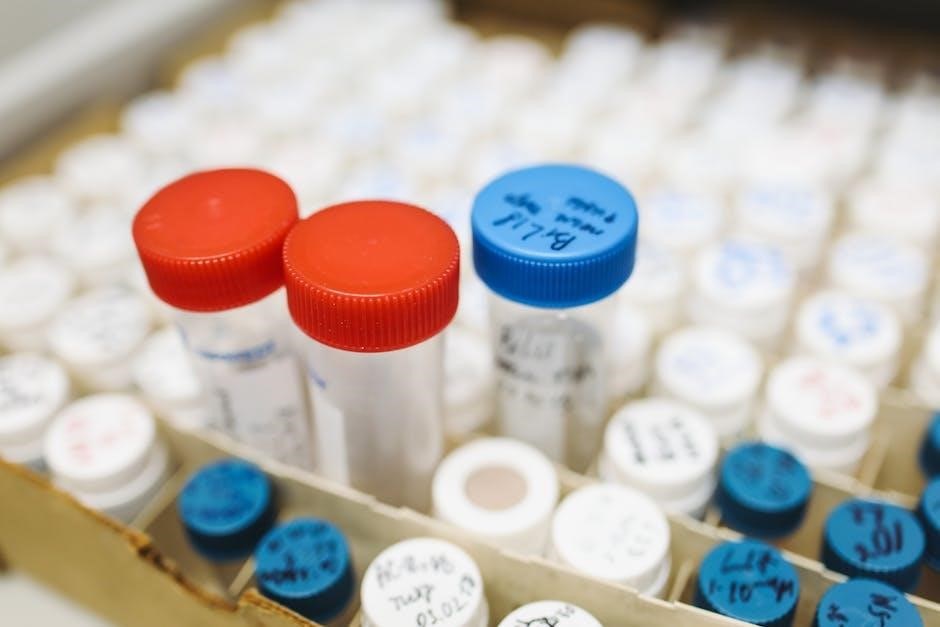Pharmacology test banks are collections of practice questions designed to help students and professionals assess and improve their knowledge in pharmacology. They are essential study tools.
1.1. What are Pharmacology Test Banks?
Pharmacology test banks are comprehensive collections of practice questions and exercises designed to assess knowledge and understanding of pharmacology concepts. These resources are often organized by specific topics‚ such as pharmacokinetics‚ pharmacodynamics‚ and drug mechanisms‚ making them highly structured for focused study. They typically include multiple-choice questions‚ case studies‚ and scenario-based problems to simulate real-world applications of pharmacological principles. Many test banks are available in PDF format‚ offering accessibility and convenience for students and professionals. These tools are widely used in educational settings to prepare for exams‚ licensure‚ and certification in pharmacology and related fields. By providing a wide range of questions‚ they help learners identify knowledge gaps and improve their critical thinking and problem-solving skills.
Key features of pharmacology test banks include detailed explanations for correct and incorrect answers‚ enabling users to understand concepts deeply. They also often align with current curriculum standards and professional competencies‚ ensuring relevance and effectiveness in learning. Overall‚ pharmacology test banks serve as invaluable resources for both students and practitioners seeking to master pharmacological knowledge.
1.2. The Role of Test Banks in Pharmacology Education
Test banks play a vital role in pharmacology education by providing students and educators with structured resources for assessment and learning. They serve as practice tools to evaluate comprehension of key pharmacological concepts‚ helping learners identify strengths and areas for improvement. Test banks are widely used in academic settings to supplement textbooks and lectures‚ offering a practical way to apply theoretical knowledge. Educators often integrate them into curricula to simulate exam conditions‚ preparing students for licensing and certification exams. Additionally‚ these resources foster active learning by encouraging critical thinking and problem-solving. They also support self-assessment‚ allowing learners to track their progress and reinforce understanding of complex topics. Overall‚ test banks are essential for enhancing engagement and achieving educational outcomes in pharmacology.

Importance of Pharmacology Test Banks
Pharmacology test banks are crucial for reinforcing knowledge‚ improving exam readiness‚ and enhancing clinical decision-making skills. They provide structured practice‚ immediate feedback‚ and insights into knowledge gaps‚ ensuring comprehensive understanding and improved performance in pharmacology.
2.1. Enhancing Knowledge Retention in Pharmacology
Pharmacology test banks play a pivotal role in enhancing knowledge retention by providing structured practice questions that reinforce key concepts. Active learning through these questions strengthens memory and understanding‚ as they often require application of knowledge rather than mere recall. Regular exposure to a variety of questions helps solidify complex pharmacological principles‚ making them easier to retain over time. Additionally‚ the immediate feedback provided by test banks allows learners to identify and address gaps in their knowledge promptly. This iterative process not only improves retention but also builds confidence in applying pharmacological concepts in real-world scenarios. By simulating exam conditions‚ test banks further prepare learners for the pressures of assessments‚ ensuring they can recall and apply information effectively when it matters most.
2.2. Preparing for Licensing and Certification Exams
Pharmacology test banks are invaluable for preparing for licensing and certification exams‚ as they provide realistic practice scenarios that mirror actual test formats. By engaging with these questions‚ learners can familiarize themselves with the structure‚ timing‚ and content of high-stakes exams. Test banks often include multiple-choice questions (MCQs) and case-based problems‚ which target critical areas of pharmacology. Regular practice helps learners identify weak areas and improve their problem-solving skills. Additionally‚ test banks simulate exam conditions‚ allowing learners to manage time effectively and reduce anxiety. This preparation enhances confidence and readiness‚ ensuring learners are well-equipped to perform optimally in professional licensing and certification exams. Consistent practice with test banks is a proven strategy for achieving success in these critical assessments.

Key Topics Covered in Pharmacology Test Banks
Pharmacology test banks cover a wide range of essential topics‚ including pharmacokinetics‚ pharmacodynamics‚ and drug mechanisms of action. These areas form the foundation of understanding how drugs interact with the body and their therapeutic applications.
3.1. Pharmacokinetics and Pharmacodynamics
Pharmacokinetics and pharmacodynamics are core concepts in pharmacology‚ focusing on how drugs move through and interact with the body. Pharmacokinetics involves the absorption‚ distribution‚ metabolism‚ and excretion of drugs‚ while pharmacodynamics explores the biochemical and physiological effects of drugs on the body. Understanding these principles is critical for predicting drug behavior‚ optimizing dosing regimens‚ and minimizing adverse effects. Test banks often include questions that assess comprehension of these processes‚ such as how drug concentration affects therapeutic outcomes or how metabolic pathways influence drug elimination. Mastery of these topics is essential for both students and professionals‚ as it forms the foundation for rational drug therapy and personalized treatment strategies.
3.2. Drug Mechanisms of Action
Drug mechanisms of action explain how medications interact with biological systems to produce therapeutic effects. These mechanisms often involve targeting specific receptors‚ enzymes‚ or ion channels to alter cellular functions. Pharmacology test banks frequently include questions that delve into the molecular and biochemical processes underlying drug actions. For example‚ questions may explore how a drug binds to a receptor‚ activates or inhibits a pathway‚ or modulates gene expression. Understanding these mechanisms is crucial for predicting drug efficacy‚ potential side effects‚ and interactions with other medications. Test banks often assess this knowledge through multiple-choice questions‚ case studies‚ or short-answer formats‚ ensuring learners can apply theoretical concepts to real-world clinical scenarios;

Sources for Pharmacology Test Bank PDFs
Pharmacology test bank PDFs are available through academic websites‚ medical schools‚ and online repositories‚ offering convenient access to study materials for learners worldwide.
4.1. Academic Websites and Platforms
Academic websites and platforms serve as primary sources for pharmacology test bank PDFs‚ offering a wide range of study materials. These resources are often curated by educational institutions or subject matter experts‚ ensuring relevance and accuracy. Many universities and online learning platforms provide access to these test banks‚ which are designed to cover core pharmacology topics. Students can utilize these resources to assess their knowledge and identify areas for improvement. Additionally‚ some platforms offer customizable test banks‚ allowing learners to focus on specific drug classes or therapeutic areas. Accessibility is a key advantage‚ as these materials are often available for free or through affordable subscriptions‚ making them a valuable tool for both students and professionals in the field of pharmacology.
4.2. Medical and Pharmacy Schools
Medical and pharmacy schools are trusted sources for pharmacology test bank PDFs‚ as they often provide these resources to support student learning. These institutions understand the importance of practice questions in mastering complex pharmacological concepts. Many schools offer test banks tailored to their curriculum‚ ensuring relevance and alignment with course content. They may also include questions that simulate real-world clinical scenarios‚ helping students apply theoretical knowledge. Additionally‚ some schools provide access to practice exams and case studies‚ which are invaluable for reinforcing understanding. These resources are typically available through the school’s library or intranet‚ making them easily accessible to enrolled students. By leveraging these materials‚ learners can gain a deeper understanding of pharmacology and improve their exam performance.

How to Use Pharmacology Test Banks Effectively
To use pharmacology test banks effectively‚ incorporate active learning strategies and simulate real exam conditions. Set specific study goals and track progress to focus on weak areas. Understand concepts deeply rather than memorizing answers‚ and review mistakes to avoid repetition. Practice under timed conditions to enhance time management and exam readiness. Engage in group study sessions to discuss complex topics and gain diverse insights. Avoid overreliance on memorization by focusing on underlying principles and applying knowledge through teaching or concept mapping. Consistent and structured use of test banks can significantly improve pharmacology knowledge and exam performance.
5.1. Active Learning Strategies
Active learning strategies involve engaging with course material through interactive and reflective practices. For pharmacology test banks‚ this means more than just passive reading. Students can benefit from self-quizzing‚ where they test their knowledge regularly. Group discussions and peer teaching are also effective‚ as explaining concepts to others reinforces understanding. Additionally‚ incorporating spaced repetition can help retain information long-term. Engaging in problem-solving exercises and case studies from test banks enhances critical thinking. Reflective learning‚ such as journaling or concept mapping‚ allows students to identify gaps in their knowledge. These strategies promote deeper comprehension and better retention of pharmacology concepts‚ making test banks a dynamic tool for active learning rather than a passive study aid.
5.2. Simulating Real Exam Conditions
Simulating real exam conditions with pharmacology test banks helps students prepare effectively for actual exams. By setting time limits and using questions formatted similarly to official exams‚ learners can build stamina and reduce anxiety. Practicing under exam-like conditions allows students to familiarize themselves with the pressure of timed assessments‚ enhancing their ability to perform under stress. This approach also helps identify areas requiring improvement‚ enabling focused study. Regularly simulating exam conditions ensures readiness and boosts confidence‚ making the actual test experience less daunting. Using test banks in this way bridges the gap between study and real-world application‚ ensuring pharmacology students are well-prepared for professional assessments.

Common Mistakes to Avoid When Using Test Banks
Overreliance on memorization and ignoring conceptual understanding are common pitfalls. Focusing solely on rote learning without grasping underlying principles can hinder long-term retention and practical application of pharmacology knowledge.
6.1. Overreliance on Memorization
Overreliance on memorization is a common mistake when using pharmacology test banks. While memorizing facts can help in the short term‚ it often leads to superficial learning. Students may focus on recalling drug names‚ dosages‚ and side effects without understanding the underlying mechanisms or physiological effects. This approach limits their ability to apply knowledge critically in clinical scenarios. For example‚ memorizing drug interactions without grasping pharmacokinetic principles can hinder problem-solving skills. Test banks should be used to reinforce conceptual understanding rather than serve as a crutch for rote learning. Encouraging active learning strategies‚ such as explaining concepts aloud or teaching others‚ can help shift focus from mere memorization to meaningful comprehension.
6.2. Ignoring Conceptual Understanding
Ignoring conceptual understanding is another pitfall when using pharmacology test banks. Many students focus solely on memorizing facts‚ such as drug names‚ dosages‚ and side effects‚ without grasping the underlying principles. This approach may lead to poor problem-solving skills‚ as pharmacology requires understanding mechanisms of action‚ pharmacokinetics‚ and therapeutic uses. For instance‚ memorizing drug interactions without knowing how they affect enzyme systems can hinder critical thinking. Overlooking conceptual understanding can result in difficulty applying knowledge to clinical scenarios‚ a key skill for pharmacists; Test banks should complement active learning by encouraging students to connect questions to broader pharmacological concepts‚ fostering a deeper grasp of the subject rather than mere rote memorization.

Benefits of Pharmacology Test Bank PDFs
Pharmacology test bank PDFs offer accessibility‚ convenience‚ and customizable study materials‚ enabling students to review and practice anytime‚ enhancing their understanding and retention of pharmacological concepts effectively.
7.1. Accessibility and Convenience
Pharmacology test bank PDFs are highly accessible‚ allowing students to study anywhere‚ anytime‚ without internet dependency. Their portable format ensures easy access on various devices‚ making them ideal for on-the-go learning. These PDFs are often searchable and bookmarkable‚ enabling quick navigation to specific topics; They eliminate the need for physical textbooks‚ reducing clutter and saving space. Additionally‚ PDFs can be easily shared among peers or printed for focused study sessions. Their convenience fosters a flexible learning environment‚ catering to diverse study preferences and schedules. This accessibility is particularly beneficial for students balancing multiple responsibilities‚ as it allows them to maximize their study time efficiently.
7.2. Customizable Study Materials
Pharmacology test bank PDFs offer the advantage of customizable study materials‚ allowing learners to tailor their preparation to specific needs. Users can highlight key concepts‚ annotate questions‚ and organize content to suit their learning style. The ability to filter questions by topic or difficulty enables focused practice on weak areas. Additionally‚ PDFs can be combined with other study resources‚ such as notes or flashcards‚ for a comprehensive review. This flexibility empowers students to create personalized study plans‚ enhancing their ability to master complex pharmacology topics. Customization also supports active learning by enabling learners to engage deeply with the material‚ promoting better retention and understanding of key concepts. This adaptability makes pharmacology test bank PDFs invaluable for self-directed learning and exam preparation.

How Pharmacology Test Banks Improve Critical Thinking
Pharmacology test banks present complex clinical scenarios‚ requiring learners to analyze data‚ evaluate drug interactions‚ and apply knowledge to real-world cases‚ enhancing problem-solving skills and logical reasoning.
8.1. Analytical Question Formats
Pharmacology test banks incorporate analytical question formats that challenge learners to think critically. These include multiple-choice questions‚ case studies‚ and problem-solving exercises that require in-depth analysis. Such questions often present complex clinical scenarios‚ drug interactions‚ and therapeutic dilemmas‚ prompting learners to evaluate evidence‚ prioritize information‚ and make informed decisions. By engaging with these formats‚ students develop the ability to break down problems‚ identify key factors‚ and apply pharmacological principles effectively. This approach fosters logical reasoning and the ability to synthesize knowledge‚ preparing learners for real-world challenges in patient care and drug therapy management.
8.2. Case-Based Learning Scenarios
Pharmacology test banks often feature case-based learning scenarios that simulate real-world clinical situations. These scenarios present detailed patient cases‚ including medical histories‚ symptoms‚ and lab results‚ requiring learners to apply pharmacological knowledge to diagnose and manage treatments. By engaging with these realistic examples‚ students develop practical problem-solving skills and learn to prioritize appropriate drug therapies. Case-based learning encourages active participation‚ helping learners connect theoretical concepts with clinical practice. This approach enhances critical thinking and decision-making abilities‚ preparing future pharmacists and healthcare professionals to handle complex patient care scenarios effectively.

The Role of Pharmacology Test Banks in Professional Development
Pharmacology test banks play a vital role in professional development by providing pharmacists with updated knowledge and skills‚ ensuring they stay current with advancements in drug therapies.
9.1. Continuing Education for Pharmacists
Pharmacology test banks are invaluable for pharmacists seeking to enhance their professional development through continuing education. These resources provide updated‚ relevant questions that reflect the latest advancements in pharmacotherapy‚ ensuring pharmacists stay current with evolving drug therapies and clinical guidelines. By engaging with test banks‚ pharmacists can identify knowledge gaps‚ refine their understanding of complex drug interactions‚ and improve patient care outcomes. The structured format of these materials allows for self-paced learning‚ making them accessible for busy professionals. Regular use of pharmacology test banks fosters a culture of lifelong learning‚ enabling pharmacists to maintain their competency and adapt to new developments in the field. This continuous education is essential for meeting certification requirements and delivering evidence-based care.
9.2. Staying Updated on Drug Therapies
Pharmacology test banks are essential tools for staying updated on the latest drug therapies‚ as they incorporate recent advancements in pharmacology and clinical practice. These resources often include questions on new drug approvals‚ updated treatment guidelines‚ and emerging therapeutic strategies. By regularly engaging with test banks‚ pharmacists and students can gain insights into cutting-edge therapies and their applications in patient care. The dynamic nature of pharmacology necessitates continuous learning‚ and test banks provide a practical way to stay informed about developments in drug mechanisms‚ dosing regimens‚ and potential interactions. This ensures that professionals can apply current evidence-based practices in real-world scenarios‚ enhancing patient outcomes and maintaining high standards of care.

Future Trends in Pharmacology Test Banks
Future trends include integration of AI-driven adaptive learning‚ interactive simulations‚ and real-time updates to reflect advancements in pharmacology‚ enhancing personalized and dynamic study experiences for learners.
10.1. Integration of AI and Adaptive Learning
The integration of AI and adaptive learning into pharmacology test banks is revolutionizing how students prepare for exams. AI algorithms analyze individual performance to identify knowledge gaps‚ offering personalized question sets tailored to each learner’s needs. This technology ensures that users focus on areas where they need improvement‚ optimizing study efficiency. Adaptive learningalso enables real-time feedback‚ allowing students to track their progress and understand complex concepts better. Additionally‚ AI-driven systems can simulate real-world clinical scenarios‚ enhancing problem-solving skills. These advancements make learning more interactive and effective‚ preparing students for both exams and practical applications in the field. As a result‚ pharmacology test banks are evolving into dynamic‚ intelligent tools that adapt to the unique needs of each user.
10.2. Expansion of Digital Platforms
The expansion of digital platforms for pharmacology test banks has made study materials more accessible and user-friendly. With the rise of online learning‚ platforms now offer mobile apps‚ interactive question banks‚ and cloud-based access‚ allowing learners to study anytime‚ anywhere. These platforms also incorporate multimedia elements like videos and animations to enhance understanding. Additionally‚ digital platforms enable collaboration‚ with features like discussion forums and peer-to-peer learning. The availability of pharmacology test banks on these platforms ensures that students and professionals can access updated content‚ reflecting the latest advancements in drug therapies. This shift toward digital solutions is transforming how pharmacology education is delivered‚ making it more flexible and engaging for modern learners.